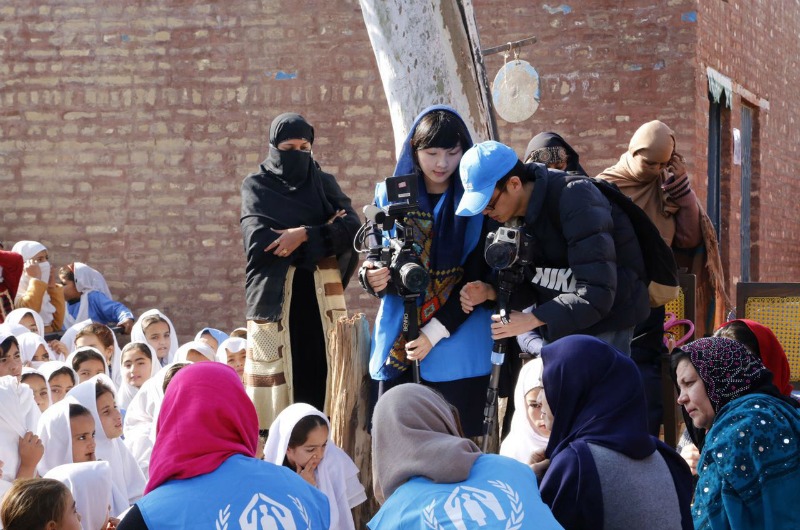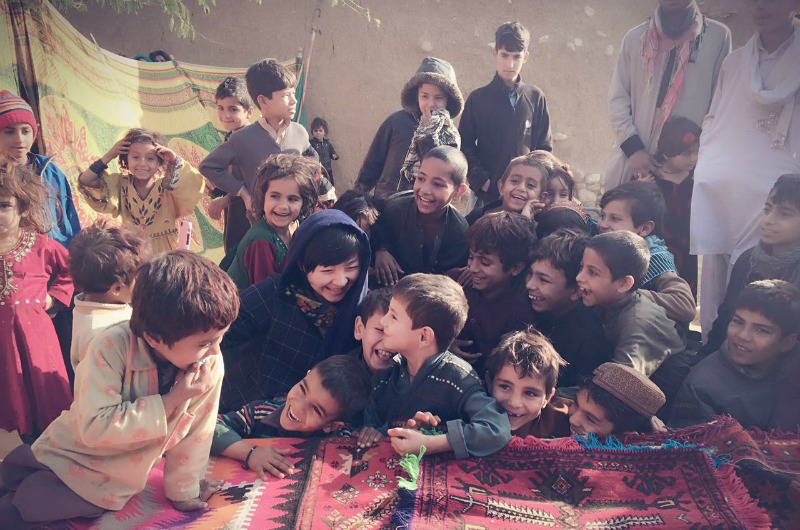Grad Student Films Documentary In Pakistan
January 26, 2016
January 26, 2016 — When television management graduate student Lili Mao first heard about the opportunity to travel to Pakistan with a Chinese celebrity and direct a documentary for the United Nations (U.N.) about the access to education for Afghani refugee girls, she was intrigued. After all, she had never worked with the U.N. or refugees before, wasn’t familiar with the refugees’ culture and way of life, and was warned about the danger involved with the trip. But that was no trouble: Mao happily accepted the opportunity of a lifetime.
“When would I ever get a chance to do that again?” questioned the second-year student.
For five days this past December, Mao met with and filmed young students at the Kot Chandna refugee village in Mianwali, Pakistan. She recorded the trip, edited footage, wrote commentary and collaborated with others to create a 15-minute documentary.
The purpose of the trip and documentary was to interview Afghan refugee teacher Aqeela Asifi, the recipient of the 2015 United Nations High Commissioner for Refugees (UNHCR) Refugee Award, about her experiences at the refugee camp. The U.N. had recognized Asifi for promoting educational opportunities in the remote refugee settlement where she’s lived since fleeing Kabul, Afghanistan in 1992.
“I chose to tell Asifi’s story with the hope that more people can know the refugee situation and could possibly be able to help them,” said Mao.
Overcoming minimal resources and significant cultural challenges, Asifi has helped over a thousand refugee girls obtain a primary education. When she first started teaching and advocating for education in the camp, she taught just a handful of students in a tent, often copying worksheets for her students by hand. Now, the children — Afghani but born and raised in Pakistan — learn in permanent schools. Mao visited two schools for boys and one school for girls.

“I interviewed some girls at their school, and they shared their dreams with me. One girl said that she wanted to be a teacher, so that she could teach other refugee girls like Asifi. Another girl said that she wanted to be a doctor to serve her country,” said Mao.
According to the U.N., over 2.6 million Afghans currently live in exile, half of which are children. While education is essential for all refugees to repatriate, resettle or integrate into their new home across the globe, only one in two refugee children can attend primary school and only one in four attend secondary school. Afghan refugees in Pakistan have even less access: 80 percent of children are currently out of school, and strict, cultural traditions keep most girls at home and married young (typically from ages 13-15, but sometimes as young as nine years old).
During the trip, Mao also traveled with and filmed Yao Chen, a popular Chinese actress known as both the “Angelina Jolie of China” for her film and activism careers and as the “Queen of Weibo” for having the most amount of followers — 78 million — on the Chinese microblogging site, Weibo (for comparison: the highest-followed account on Twitter is Katy Perry with 81 million followers). Chen was also included in Time magazine’s list of the 100 most influential people in 2014.
The first Chinese UNHCR Goodwill Ambassador ever, Chen has visited refugees in the Philippines, Thailand, Ethiopia and Paris. She uses her fame and partnership with the U.N. to help refugees tell their stories to the world, which is exactly what Mao aims to accomplish with her finished documentary.
Mao first heard about this professional opportunity from a former colleague from China Central Television (CCTV) when she visited China this past October. Less than two months later, she was on a plane flying from Beijing, China, to Islamabad, Pakistan.
The entourage on the trip included Mao, Chen, Chen’s agent, a journalist, a photographer, a U.N. staff member and a UNHCR official. Together, they stayed in mice-infested temporary housing quarters stationed near the refugee camp, where they weren’t allowed to go out alone or after sunset.

“The rules of the refugee camp were very conservatively traditional. We were all required to dress in loose-fitting, ankle-length clothes and cover our hair and necks with headscarves. Women were not allowed to have contact with men, even to shake hands, and we never saw any women walking out in public,” said Mao.
At least four security guards carrying AK-47 assault rifles monitored the group at all times, even accompanying them to the restroom. The U.N. staff had also told the group that attacks were normal occurrences where they’d be traveling — the airport, the inside of schools, even the U.N. office — and taught Mao and the others how to escape from possible situations.
Even with the risks, Mao knew it was important to capture the story of Asifi and other Afghani refugees in Pakistan. Plus, she said, she was excited to finally work as a war correspondent.
“I now have a sense of duty to use my ability to help others no matter where I am working,” she said.
Snippets of the documentary have already debuted in China and Hong Kong. The UNHCR will release the entire film onWorld Refugee Day this June.
When television management graduate student Lili Mao first heard about the opportunity to travel to Pakistan with a Chinese celebrity and direct a documentary for the United Nations (U.N.) about the access to education for Afghani refugee girls, she was intrigued. After all, she had never worked with the U.N. or refugees before, wasn’t familiar with the refugees’ culture and way of life, and was warned about the danger involved with the trip. But that was no trouble: Mao happily accepted the opportunity of a lifetime. - See more at: http://drexel.edu/now/archive/2016/January/Lili-Mao/#sthash.qUO2OSWe.dpuf